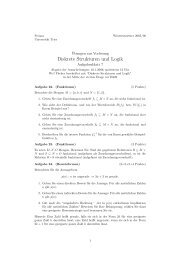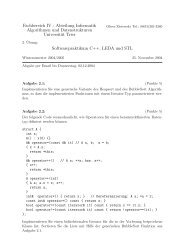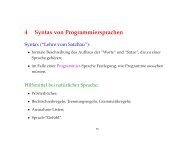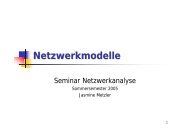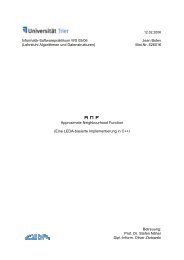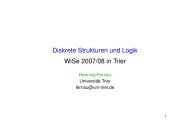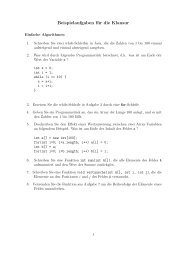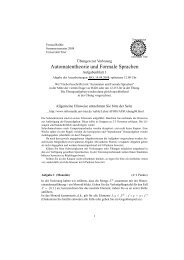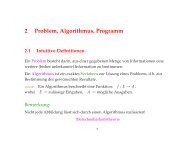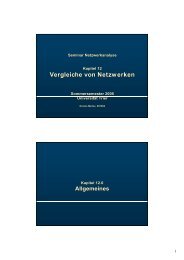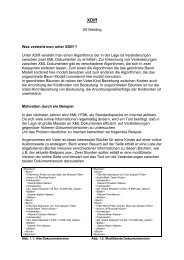- Page 1:
Version 5.0 The LEDA User Manual Al
- Page 4 and 5:
4.14 Socket Streambuffer ( socket s
- Page 6 and 7:
9.11 Move-To-Front Coder II ( MTF2C
- Page 8 and 9:
13.1.2 Handles and Iterators . . .
- Page 10 and 11:
16.7 Simplices in 3D-Space ( d3 sim
- Page 13:
License Terms and Availability Any
- Page 16 and 17:
7. LEDA is available from Algorithm
- Page 19 and 20:
Chapter 2 Basics An extended versio
- Page 21 and 22:
XYZ y(x1, ... ,xt); ,tk > and uses
- Page 23 and 24:
2.3.1 Linear Orders Many data types
- Page 25 and 26:
dictionary D0; // default ordering
- Page 27 and 28:
2.3.3 Implementation Parameters Man
- Page 29 and 30:
lookup returned the location where
- Page 31:
list::iterator defines the iterator
- Page 34 and 35:
• internal (LEDA/incl/internal/)
- Page 36 and 37:
string s(const char ∗ p); string
- Page 38 and 39:
ool bool bool bool istream& ostream
- Page 40 and 41:
string buffer, i.e., all output ope
- Page 42 and 43:
andom source& S ≫ char& x random
- Page 44 and 45:
int R.set weight(int i, int g) sets
- Page 46 and 47:
4.10 Memory Allocator ( leda alloca
- Page 48 and 49:
4.11 Error Handling ( error ) LEDA
- Page 50 and 51:
4.12 Files and Directories ( file )
- Page 52 and 53:
4.13 Sockets ( leda socket ) 1. Def
- Page 54 and 55:
ool S.receive string(string& s) rec
- Page 56 and 57:
ool sb.failed( ) returns whether a
- Page 58 and 59:
4.15 Some Useful Functions ( misc )
- Page 60 and 61:
4.16 Timer ( timer ) 1. Definition
- Page 62 and 63:
unsigned fibonacci(unsigned n) { st
- Page 64 and 65:
unsigned fibonacci(unsigned n) { st
- Page 66 and 67:
int Hash(const two tuple& p) hash f
- Page 68 and 69:
3. Creation four tuple p; creates a
- Page 70 and 71:
4.21 A date interface ( date ) 1. D
- Page 72 and 73:
3. Creation date D; creates an inst
- Page 74 and 75:
string D.get month name( ) returns
- Page 76 and 77:
Now we show an example in which dif
- Page 78 and 79:
integer integer a(const char ∗ s)
- Page 80 and 81:
5.2 Rational Numbers ( rational ) 1
- Page 82 and 83:
5.3 The data type bigfloat ( bigflo
- Page 84 and 85:
ounding modes bigfloat :: get round
- Page 86 and 87:
ostream& ostream& os ≪ const bigf
- Page 88 and 89:
double x.get double error( ) bigflo
- Page 90 and 91:
int int real roots(const Polynomial
- Page 92 and 93:
√ y v = b 1 c 2 + b 2 c 1 ± sign
- Page 94 and 95:
5.5 Interval Arithmetic in LEDA ( i
- Page 96 and 97:
void x.set midpoint(VOLATILE I doub
- Page 98 and 99:
5.7 The mod kernel of type residual
- Page 100 and 101:
int residual :: required primetable
- Page 102 and 103:
5.9 A Floating Point Filter ( float
- Page 104 and 105:
5.10 Double-Valued Vectors ( vector
- Page 106 and 107:
double v.zcoord( ) returns the seco
- Page 108 and 109:
matrix matrix matrix vector M + con
- Page 110 and 111:
5.12 Vectors with Integer Entries (
- Page 112 and 113:
5.13 Matrices with Integer Entries
- Page 114 and 115:
integer matrix inverse(const intege
- Page 116 and 117:
distinct representatives and linear
- Page 118 and 119:
at vector v(const array& A); introd
- Page 120 and 121:
int compare by angle(const rat vect
- Page 122 and 123:
5.15 Real-Valued Vectors ( real vec
- Page 124 and 125:
int compare by angle(const real vec
- Page 126 and 127:
eal matrix M + const real matrix& M
- Page 128 and 129:
5.17.2 Integration double integrate
- Page 130 and 131:
array A(int low, const E& x, const
- Page 132 and 133:
int A.binary locate(int (∗cmp)(co
- Page 134 and 135:
6.3 Stacks ( stack ) 1. Definition
- Page 136 and 137: 6.5 Bounded Stacks ( b stack ) 1. D
- Page 138 and 139: 6.7 Linear Lists ( list ) 1. Defini
- Page 140 and 141: const E& L.pop front( ) same as L.p
- Page 142 and 143: Sorting and Searching void L.sort(i
- Page 144 and 145: Input and Output void L.read(istrea
- Page 146 and 147: 6.8 Singly Linked Lists ( slist ) 1
- Page 148 and 149: 6.9 Sets ( set ) 1. Definition An i
- Page 150 and 151: 4. Implementation Sets are implemen
- Page 152 and 153: int set S | const int set& T return
- Page 154 and 155: d int set S − const d int set& T
- Page 156 and 157: 6.12 Partitions ( partition ) 1. De
- Page 158 and 159: 6.13 Parameterized Partitions ( Par
- Page 160 and 161: void D.evert(vertex v) makes v the
- Page 162 and 163: 4. Implementation Dynamic collectio
- Page 164 and 165: dictionary D(int (∗cmp)(const K&
- Page 166 and 167: 7.2 Dictionary Arrays ( d array ) 1
- Page 168 and 169: { d_array dic; dic["hello"] = "hall
- Page 170 and 171: ool A.empty( ) returns true if A is
- Page 172 and 173: Note that it is not possible to ite
- Page 174 and 175: void M.clear( ) clears M by making
- Page 176 and 177: p dictionary D.change inf(p dic ite
- Page 178 and 179: void D.del(const K& k) deletes the
- Page 180 and 181: 3. Creation sortseq S; creates an i
- Page 182 and 183: seq item S.max item( ) returns the
- Page 184 and 185: Iteration forall items(it, S) { “
- Page 188 and 189: p queue Q(int (∗cmp)(const P & ,
- Page 190 and 191: 8.2 Bounded Priority Queues ( b pri
- Page 193 and 194: Chapter 9 Lossless Compression Befo
- Page 195 and 196: pression module available. Then you
- Page 197 and 198: uint32 C.encode memory chunk(const
- Page 199 and 200: 9.2 Static Arithmetic Coder ( A0sCo
- Page 201 and 202: 9.3 Prediction by Partial Matching
- Page 203 and 204: void void C.set tgt file(const char
- Page 205 and 206: uint32 C.encode memory chunk(const
- Page 207 and 208: 9.5 Dictionary Based Coder ( DictCo
- Page 209 and 210: 9.6 Static Huffman Coder ( HuffmanC
- Page 211 and 212: 9.7 Adaptive Huffman Coder ( Adapti
- Page 213 and 214: 9.8 Run-Length Coder ( RLECoder ) 1
- Page 215 and 216: 9.9 Burrows-Wheeler Transform ( BWT
- Page 217 and 218: 4. Implementation Our implementatio
- Page 219 and 220: uint32 C.encode memory chunk(const
- Page 221 and 222: uint32 C.decode memory chunk(const
- Page 223 and 224: uint32 C.decode memory chunk(const
- Page 225 and 226: uint32 C.encode memory chunk(const
- Page 227 and 228: 9.17 MD5 Checksum ( MD5SumCoder ) 1
- Page 229 and 230: void is.close( ) detaches is from i
- Page 231 and 232: 3. Operations bool is.is open( ) re
- Page 233 and 234: uint32 C.encode memory chunk(const
- Page 235 and 236: 9.24 Automatic Decoder ( AutoDecode
- Page 237 and 238:
9.25 Block Coder ( BlockCoder ) 1.
- Page 239 and 240:
string C.get description( ) provide
- Page 241 and 242:
9.26 Memory Streambuffer ( memory s
- Page 243 and 244:
Chapter 10 Symmetric Key Cryptograp
- Page 245 and 246:
in.get_coder()->get_coder3()->set_k
- Page 247 and 248:
We want to address another importan
- Page 249 and 250:
CryptByteString s(uint16 idx start,
- Page 251 and 252:
CryptKey CryptByteString CryptKey C
- Page 253 and 254:
corresponding block in the plaintex
- Page 255 and 256:
uint32 C.encode memory chunk(const
- Page 257 and 258:
10.5 Authentication ( OMACCoder ) 1
- Page 259 and 260:
void C.reset(bool keep parameters =
- Page 261 and 262:
void void streambuf ∗ void void C
- Page 263 and 264:
10.7 Secure Socket Streambuffer ( s
- Page 265:
ool sb.sends acknowledge( ) returns
- Page 268 and 269:
there is an edge (v, w) ∈ E; in a
- Page 270 and 271:
list G.adj edges(node v) returns ad
- Page 272 and 273:
edge edge G.new edge(node v, edge e
- Page 274 and 275:
void void G.move edge(edge e, node
- Page 276 and 277:
c) Reversal Edges and Maps void G.m
- Page 278 and 279:
const list& G.all faces( ) returns
- Page 280 and 281:
void G.write(ostream& O = cout) wri
- Page 282 and 283:
forall adj nodes(v, w) { “the nod
- Page 284 and 285:
edge G.new edge(node v, node w, con
- Page 286 and 287:
11.3 Static Graphs ( static graph )
- Page 288 and 289:
When using the data types node slot
- Page 290 and 291:
node G.outdeg(node v) returns the n
- Page 292 and 293:
11.4 Undirected Graphs ( ugraph ) 1
- Page 294 and 295:
11.6 Planar Maps ( planar map ) 1.
- Page 296 and 297:
11.7 Parameterized Planar Maps ( PL
- Page 298 and 299:
11.8 Node Arrays ( node array ) 1.
- Page 300 and 301:
11.9 Edge Arrays ( edge array ) 1.
- Page 302 and 303:
11.10 Face Arrays ( face array ) 1.
- Page 304 and 305:
11.11 Node Maps ( node map ) 1. Def
- Page 306 and 307:
11.12 Edge Maps ( edge map ) 1. Def
- Page 308 and 309:
11.13 Face Maps ( face map ) 1. Def
- Page 310 and 311:
11.14 Two Dimensional Node Arrays (
- Page 312 and 313:
11.15 Two-Dimensional Node Maps ( n
- Page 314 and 315:
11.16 Sets of Nodes ( node set ) 1.
- Page 316 and 317:
11.18 Lists of Nodes ( node list )
- Page 318 and 319:
11.19 Node Partitions ( node partit
- Page 320 and 321:
const P & Q.inf(node v) returns the
- Page 322 and 323:
} { int dv = dist[v]; edge e; foral
- Page 324 and 325:
void random bigraph(graph& G, int a
- Page 326 and 327:
void triangulation map(graph& G, in
- Page 328 and 329:
11.23 Miscellaneous Graph Functions
- Page 330 and 331:
ool Is Triconnected(const graph& G,
- Page 332 and 333:
11.24 Markov Chains ( markov chain
- Page 334 and 335:
11.26 GML Parser for Graphs ( gml g
- Page 336 and 337:
ool (*gml node rule)(const gml obje
- Page 338 and 339:
void parser.add graph done rule(gml
- Page 341 and 342:
Chapter 12 Graph Algorithms This ch
- Page 343 and 344:
list BFS(const graph& G, node s, no
- Page 345 and 346:
12.2 Shortest Path Algorithms ( sho
- Page 347 and 348:
template void DIJKSTRA T(const gra
- Page 349 and 350:
12.3 Maximum Flow ( max flow ) Let
- Page 351 and 352:
inline bool CHECK MAX FLOW T(const
- Page 353 and 354:
12.4 Min Cost Flow Algorithms ( min
- Page 355 and 356:
12.6 Maximum Cardinality Matchings
- Page 357 and 358:
• to compute maximum and minimum
- Page 359 and 360:
template list MAX WEIGHT ASSIGNMEN
- Page 361 and 362:
or connects two nodes labeled with
- Page 363 and 364:
Heuristics for Initial Matching Con
- Page 365 and 366:
list MAX WEIGHT PERFECT MATCHING T(
- Page 367 and 368:
ool CHECK WEIGHTS T(const graph& G,
- Page 369 and 370:
void CreateInputGraph(graph& G, lis
- Page 371 and 372:
12.12 Euler Tours ( euler tour ) An
- Page 373 and 374:
int KURATOWSKI(graph& G, list& V, l
- Page 375 and 376:
12.14 Graph Drawing Algorithms ( gr
- Page 377:
int bool bool ORTHO EMBEDDING(const
- Page 380 and 381:
• Iterators are not bound to a lo
- Page 382 and 383:
• Classes GRAPH and UGRAPH (sects
- Page 384 and 385:
An example for an algorithm that su
- Page 386 and 387:
void it.update(leda :: node n) it m
- Page 388 and 389:
EdgeIt& bool it = const EdgeIt& it2
- Page 390 and 391:
ool it.valid( ) returns true if and
- Page 392 and 393:
void it.reset end( ) resets it to G
- Page 394 and 395:
void it.init(const leda :: graph& G
- Page 396 and 397:
#include < LEDA/graph/graph iterato
- Page 398 and 399:
AdjIt& ++it performs one step forwa
- Page 400 and 401:
13.9 Filter Node Iterator ( FilterN
- Page 402 and 403:
2. Creation CompPred cp(const DA& d
- Page 404 and 405:
4. Example First two simple observe
- Page 406 and 407:
Note: There are specialized version
- Page 408 and 409:
4. Implementation Constant Overhead
- Page 410 and 411:
2. Creation node member da da; intr
- Page 412 and 413:
13.17 Breadth First Search (flexibl
- Page 414 and 415:
With this iterator you can easily i
- Page 416 and 417:
void algorithm.finish algo( ) execu
- Page 418 and 419:
Initialization of get queue() with
- Page 420 and 421:
13.21 Dijkstra(flexible) ( GIT DIJK
- Page 423 and 424:
Chapter 14 Basic Data Types for Two
- Page 425 and 426:
double p.sqr dist(const point& q) i
- Page 427 and 428:
ool collinear(const point& a, const
- Page 429 and 430:
14.2 Segments ( segment ) 1. Defini
- Page 431 and 432:
ool s.contains(const point& p) bool
- Page 433 and 434:
14.3 Straight Rays ( ray ) 1. Defin
- Page 435 and 436:
ay r.reflect(const point& p) return
- Page 437 and 438:
double l.direction( ) returns the d
- Page 439 and 440:
int cmp slopes(const line& l1 , con
- Page 441 and 442:
circle C(const circle& c, int); 4.
- Page 443 and 444:
double C.distance(const circle& D)
- Page 445 and 446:
POLYGON POLYGON P (const list& pl,
- Page 447 and 448:
list P.simple parts( ) returns the
- Page 449 and 450:
POLYGON n gon(int n, CIRCLE C, doub
- Page 451 and 452:
GEN POLYGON P (const POLYGON & p, C
- Page 453 and 454:
list P.intersection(const SEGMENT &
- Page 455 and 456:
The following functions are only av
- Page 457 and 458:
int t.side of(const point& p) regio
- Page 459 and 460:
14.9 Iso-oriented Rectangles ( rect
- Page 461 and 462:
ectangle r.rotate90(const point& p,
- Page 463 and 464:
at point p(const point& p1 , int pr
- Page 465 and 466:
int cmp signed dist(const rat point
- Page 467 and 468:
14.11 Rational Segments ( rat segme
- Page 469 and 470:
integer s.W2( ) returns the third h
- Page 471 and 472:
at segment s.rotate90(int i = 1) re
- Page 473 and 474:
at point r.source( ) returns the so
- Page 475 and 476:
14.13 Straight Rational Lines ( rat
- Page 477 and 478:
at line l.reflect(const rat point&
- Page 479 and 480:
14.14 Rational Circles ( rat circle
- Page 481 and 482:
at circle C.translate(integer dx, i
- Page 483 and 484:
at point t[int i] returns the i-th
- Page 485 and 486:
14.16 Iso-oriented Rational Rectang
- Page 487 and 488:
at rectangle r.include(const rat re
- Page 489 and 490:
14.17 Real Points ( real point ) 1.
- Page 491 and 492:
eal point p.reflect(const real poin
- Page 493 and 494:
int compare by angle(const real poi
- Page 495 and 496:
4. Operations real point s.start( )
- Page 497 and 498:
eal segment s.reverse( ) returns s
- Page 499 and 500:
eal point r.point2( ) returns a poi
- Page 501 and 502:
14.20 Straight Real Lines ( real li
- Page 503 and 504:
eal line l.translate(const real vec
- Page 505 and 506:
14.21 Real Circles ( real circle )
- Page 507 and 508:
eal circle C + const real vector& v
- Page 509 and 510:
14.22 Real Triangles ( real triangl
- Page 511 and 512:
eal triangle t + const real vector&
- Page 513 and 514:
eal r.xmin( ) returns the minimal x
- Page 515 and 516:
list r.intersection(const real rect
- Page 517 and 518:
double WIDTH(const list& L, line& l
- Page 519 and 520:
edge CONVEX COMPONENTS(const gen po
- Page 521 and 522:
ool Is Delaunay Diagram(const GRAPH
- Page 523 and 524:
void SWEEP SEGMENTS(const list& S,
- Page 525 and 526:
template bool Is CCW Ordered Plane
- Page 527 and 528:
TRANSFORM T (const TRANSFORM & T1 )
- Page 529 and 530:
14.26 Point Generators ( point gene
- Page 531 and 532:
void random points near circle(int
- Page 533 and 534:
14.27 Point on Rational Circle ( r
- Page 535 and 536:
14.28 Segment of Rational Circle (
- Page 537 and 538:
ool cs.contains(const r circle poin
- Page 539 and 540:
void SWEEP SEGMENTS(const list& L,
- Page 541 and 542:
circle polygon P (const list& chain
- Page 543 and 544:
circle polygon P.reflect(const rat
- Page 545 and 546:
14.30 Generalized polygons with cir
- Page 547 and 548:
circle gen polygon P (const rat cir
- Page 549 and 550:
circle polygon P.to r circle polygo
- Page 551 and 552:
Chapter 15 Advanced Data Types for
- Page 553 and 554:
4. Implementation Two-dimensional d
- Page 555 and 556:
POINT SET POINT SET T (const list&
- Page 557 and 558:
node T.lookup(POINT p, const list&
- Page 559 and 560:
void T.draw edge(edge e, void (∗d
- Page 561 and 562:
void S.change inf(is item it, const
- Page 563 and 564:
list S.intersection sorted(const se
- Page 565 and 566:
list S.intersection sorted(const ra
- Page 567 and 568:
Chapter 16 Basic Data Types for Thr
- Page 569 and 570:
double p.ydist(const d3 point& q) r
- Page 571 and 572:
int region of sphere(const d3 point
- Page 573 and 574:
16.2 Straight Rays in 3D-Space ( d3
- Page 575 and 576:
16.3 Segments in 3D-Space ( d3 segm
- Page 577 and 578:
16.4 Straight Lines in 3D-Space ( d
- Page 579 and 580:
16.5 Planes ( d3 plane ) 1. Definit
- Page 581 and 582:
ool p.contains(const d3 point& q) b
- Page 583 and 584:
d3 sphere S.translate(double dx, do
- Page 585 and 586:
ool S.insphere(const d3 point& p) r
- Page 587 and 588:
integer p.W( ) returns the fourth h
- Page 589 and 590:
int orientation(const d3 rat point&
- Page 591 and 592:
ool affinely independent(const list
- Page 593 and 594:
d3 rat point random d3 rat point on
- Page 595 and 596:
16.9 Straight Rational Rays in 3D-S
- Page 597 and 598:
16.10 Rational Lines in 3D-Space (
- Page 599 and 600:
ool l.intersection(const d3 rat lin
- Page 601 and 602:
ational s.dy( ) returns ycoord2 ( )
- Page 603 and 604:
16.12 Rational Planes ( d3 rat plan
- Page 605 and 606:
ool p.contains(const d3 rat point&
- Page 607 and 608:
d3 rat sphere S.translate(const rat
- Page 609 and 610:
ool S.in simplex(const d3 rat point
- Page 611:
16.16 3D Triangulation and Voronoi
- Page 614 and 615:
3. Operations void col.set rgb(int
- Page 616 and 617:
4. Minimal and maximal coordinates
- Page 618 and 619:
All four variants initialize the co
- Page 620 and 621:
line style W.set line style(line st
- Page 622 and 623:
int W.get node width( ) returns the
- Page 624 and 625:
void void void W.draw segment(const
- Page 626 and 627:
void void W.draw bezier arrow(const
- Page 628 and 629:
void W.draw rectangle(double x 0 ,
- Page 630 and 631:
double W.text box(double x 0 , doub
- Page 632 and 633:
int void void void void void void W
- Page 634 and 635:
3.5 Input The main input operation
- Page 636 and 637:
int W.read mouse arc(double x 0 , d
- Page 638 and 639:
int W.read int(string p) displays a
- Page 640 and 641:
in this section add panel items or
- Page 642 and 643:
panel item W.lstyle item(string s,
- Page 644 and 645:
panel item panel item panel item W.
- Page 646 and 647:
int W.button(char ∗ pr1 , char
- Page 648 and 649:
void W.disable button(int b) disabl
- Page 650 and 651:
17.3 Panels ( panel ) 1. Definition
- Page 652 and 653:
int M.open(window& W, int x, int y)
- Page 654 and 655:
17.6 Graph Windows ( GraphWin ) 1.
- Page 656 and 657:
The corresponding types are: gw_nod
- Page 658 and 659:
void gw.set frame label(const char
- Page 660 and 661:
int gw.set gen edges(int m) sets th
- Page 662 and 663:
ool gw.is selected(edge e) returns
- Page 664 and 665:
void gw.place into box(double x0 ,
- Page 666 and 667:
void gw.add edge menu(string label,
- Page 668 and 669:
void void void int gw.add separator
- Page 670 and 671:
ool gw.wait(const char ∗ msg) dis
- Page 672 and 673:
17.7 The GraphWin (GW) File Format
- Page 674 and 675:
order color an attribute of type in
- Page 676 and 677:
direction an attribute of type int
- Page 678 and 679:
0.9074733 1 0 0 1 1 1 5 (0,0) (0,0)
- Page 680 and 681:
changes. The contents of the result
- Page 682 and 683:
The geometric objects The objects s
- Page 684 and 685:
• (rat )gen polygon or a d3 point
- Page 686 and 687:
ool write postscript(const CONTAINE
- Page 688 and 689:
eturn 0; } template void GW.set up
- Page 690 and 691:
void GW.set selected objects(GeoEdi
- Page 692 and 693:
ool GW.get show status( ) return bo
- Page 694 and 695:
string string color GW.get name(geo
- Page 696 and 697:
ool GW.set visible(geo scene sc, bo
- Page 698 and 699:
#include #include using namespace
- Page 700 and 701:
template line style GW.set obj lin
- Page 702 and 703:
template bool GW.get obj text(GeoB
- Page 704 and 705:
ool GW.set show position(bool sp) s
- Page 706 and 707:
• Pre add handler • Pre add cha
- Page 708 and 709:
ool GW.set post rotate handler(GeoE
- Page 710 and 711:
void void void void void int int GW
- Page 712 and 713:
void GW.add dependence(geo scene sc
- Page 714 and 715:
int GW.set limit(GeoEditScene ∗ e
- Page 716 and 717:
#include < LEDA/graphics/d3 window.
- Page 718 and 719:
string D.set message(string msg) se
- Page 720 and 721:
18.2 User Implementations In additi
- Page 722 and 723:
18.2.2 Priority Queues Any class pr
- Page 725 and 726:
Appendix A Technical Information Th
- Page 727 and 728:
A.3 Source Code on UNIX Platforms S
- Page 729 and 730:
A.5 Source Code on Windows with Bor
- Page 731 and 732:
Preparations Unpacking the LEDA dis
- Page 733 and 734:
Files and Directories To compile an
- Page 735 and 736:
(13) Choose ”Directories” (14)
- Page 737 and 738:
Possible values for are ”-ML”,
- Page 739 and 740:
(5’) In the ”File” menu click
- Page 741 and 742:
1. Change the file autoexec.bat as
- Page 743 and 744:
Compiling and Linking in Microsoft
- Page 745 and 746:
Compiling and Linking Application P
- Page 747 and 748:
Preparations To install LEDA you on
- Page 749 and 750:
(9b) Click on ”C/C++” and ”Pr
- Page 751 and 752:
2. Restart Windows 95/98 for the ch
- Page 753 and 754:
Programs using graph data types: bc
- Page 755 and 756:
• Make sure that there is a file
- Page 757 and 758:
Appendix B The golden LEDA rules Th
- Page 759 and 760:
(c) If y is the copy of a value x o
- Page 761 and 762:
4. list_item it = L.first(); L.del_
- Page 763 and 764:
Appendix C The LEDA Tools for Manua
- Page 765 and 766:
#ifndef LEDA_STACK_H #define LEDA_S
- Page 767:
foo.[lw|nw|w] lextract ❄ foo.man
- Page 770 and 771:
[15] C. Burnikel, R. Fleischer, K.
- Page 772 and 773:
[49] T. Iwata, K. Kurosawa: “OMAC
- Page 774 and 775:
[85] R.E. Tarjan: “Depth First Se
- Page 776 and 777:
acknowledge(...) GraphWin . . . . .
- Page 778 and 779:
BELLMAN FORD T(...) . . . . . . . .
- Page 780 and 781:
point . . . . . . . . . . . . . . .
- Page 782 and 783:
dynamic markov chain . . . . . . .
- Page 784 and 785:
del min() b node pq . . . . . . . .
- Page 786 and 787:
draw hull(...) POINT SET . . . . .
- Page 788 and 789:
MTFCoder . . . . . . . . . . . . .
- Page 790 and 791:
forall in edges(...). . . . . . . .
- Page 792 and 793:
get edit edge() GraphWin . . . . .
- Page 794 and 795:
get param(...) GraphWin . . . . . .
- Page 796 and 797:
eal . . . . . . . . . . . . . . . .
- Page 798 and 799:
dictionary . . . . . . . . . . . .
- Page 800 and 801:
is hidden(...) graph . . . . . . .
- Page 802 and 803:
language date . . . . . . . . . . .
- Page 804 and 805:
maximal planar graph(...). . . . .
- Page 806 and 807:
at triangle . . . . . . . . . . . .
- Page 808 and 809:
eal triangle . . . . . . . . . . .
- Page 810 and 811:
project yz(...) d3 line . . . . . .
- Page 812 and 813:
d3 plane . . . . . . . . . . . . .
- Page 814 and 815:
circle segment . . . . . . . . . .
- Page 816 and 817:
window . . . . . . . . . . . . . .
- Page 818 and 819:
set keys in file(...) CryptAutoDeco
- Page 820 and 821:
GraphWin . . . . . . . . . . . . .
- Page 822 and 823:
priority queue. . . . . . . . . . .
- Page 824 and 825:
STRONG COMPONENTS(...) . . . . . .
- Page 826 and 827:
d3 sphere . . . . . . . . . . . . .
- Page 828 and 829:
W1() rat segment . . . . . . . . .
- Page 830:
eal rectangle . . . . . . . . . . .



